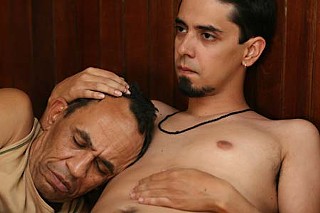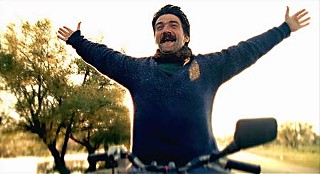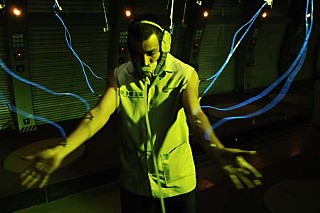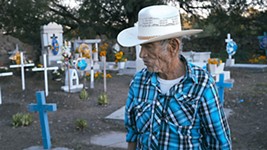Cine las Americas Previews
Fri., April 17, 2009
La Mujer Sin Cabeza (The Headless Woman)
New Releases, Argentina/France/Italy/SpainD: Lucrecia Martel; with Maria Onetto, Claudia Cantero, César Bordón
Although the title makes this thoughtful Argentine movie sound like a bloody slasher film, Veró (Onetto) manages to keep her head attached to her body at all times. It's her wits that seem to be scattered after she hits something – a dog? – while driving and reaching for her cell phone. (There's always a phone ringing somewhere in this movie, and rain.) She drives off, then a seeming amnesia sets in, followed by a kind of dislocation in her own skin. What exactly is going on is never completely clear, yet Veró's uneasiness is always fully palpable. Martel frames her images from largely stationary midshots, her formalism providing depth but little peripheral vision – much like what Veró's partial comprehension must be like. Martel's visual and narrative palettes have reached a grand fusion in this, her third feature film. Hers are not women on the verge; they are women out of sorts. – Marjorie Baumgarten
Luca
Documentary Feature Competition, ArgentinaD: Rodrigo Espina
Times are tough and ripe with the promise of street battles, class war, DIY escapist music, and fervor – disaffected youth, really – at being forced to bear witness to the disintegration of an entire society. What to do, then, but rip it up and start again, diving for hope in the hopeless art of one post-punk expat rabble rouser named Luca Prodan, Argentina's Joe Strummer by way of Darby Crash? It was 1981 everywhere else, but for Prodan and his legendary if short-lived band Sumo, it was the Argentine version of Joy Division under political siege. Italian-Scottish by birth, a heroin addict and fun-loving criminal by choice, he changed the face of rock en Español forever. And then he died: liver gone south, few recordings made, unknown outside of his fierce battle for the Falkland Islands and a Latin American musical scene that melded the most passionate aspects of Black Flag, the Clash, and Crass. Espina's music doc recounts the downward slide of both Argentina and Thatcher's long-forgotten Falklands debacle: "How Does It Feel to Be the Mother of 1,000 Dead?" Luca, like Crass, had a definite answer. In their blending of musical styles ranging from funk, Gang of Four-ish edgy post-punk, and joyful chaos – "Stand By Me" is a highlight – Prodan and Sumo forged a legend in feedback and socially conscious chaos. – Marc Savlov
Simples Mortais (Mere Mortals)
Narrative Feature Competition, BrazilD: Mauro Giuntini; with Leonardo Medeiros, Narciza Leão, Chico Sant'Anna, Eduardo Moraes
No sun-drenched beaches, dark men in white suits, or babes at Carnaval here, Mere Mortals defies Brazilian stereotypes and braids together the lives of three middle-class strangers at three different (but similarly pivotal) family junctures. Sex and mortality are the binding threads. TV anchorwoman Diana wants to start a family, but her hormonal obsession threatens both relationship and career. Poetry professor Jonas lines his bird's cage with pages of his work, and his desire to bed his student muse will tear his family apart. Struggling musician Amadue feels hopeless as his son stumbles into manhood; they avoid coming to blows through sharing a joint, music, and some laxatives. Grounded by Patrick de Jongh's score (featuring songs by Gilberto Gil and Caetano Veloso) and wielding an understanding of the language of Cassavetes and La Nouvelle Vague, director Giuntini weaves the midlife crises that grip these less than satisfying lives into a more than satisfying film. – Kate X Messer
El Baño del Papa (The Pope's Toilet)
New Releases, Uruguay/Brazil/FranceD: César Charlone and Enrique Fernández; with César Troncoso, Virginia Méndez, Mario Silva, Virginia Ruiz
In 1988, Pope John Paul II visited Melo, Uruguay, a rural town near the Brazilian border. Around that fact filmmakers Fernández and Charlone (the acclaimed cinematographer on Fernando Meirelles' City of God and Blindness) have crafted this fictional drama about the disappointment experienced by the townspeople who prepared enough chorizo and other foodstuffs for an onslaught of visitors who, as it turned out, never showed up. This metaphor for the workings of the Roman Catholic Church, whose pie-in-the-sky promises are seen to keep its poor believers paddling up shit creek while on Earth, underlies the movie yet never becomes its dominant message. Beto (Troncoso), the protagonist, is something of a comical figure, although his frustrations reveal a very dark side as well. Like so many men in the town, Beto smuggles goods across the border on his rickety bicycle. Will his idea to build a public facility for all those out-of-town visitors pay off? – Marjorie Baumgarten
Sleep Dealer
Narrative Feature Competition, USA/MexicoD: Alex Rivera; with Luis Fernando Peña, Leonor Varela, Jacob Vargas
"Is our future a thing of the past?" Memo Cruz's father asks his son. Memo (Peña) is a technophile escapist who spends his nights listening to his makeshift satellite radio in the back room of his family's home in Santa Ana del Rio, Oaxaca, where the rio is no more. Water wars rage, where "aqua-terrorists" are gunned down by drone pilots, and the military has gone corporate. Rivera's debut feature, which he directed, edited, and wrote, takes place in a future where the borders are closed, workers slave away in virtual sweatshops, and technology serves as drug and warden, yet it's completely plausible of a not-too-distant future. Memo leaves home for Tijuana, procures employment working remotely as a robot in San Diego, and meets Luz (Varela), a "coyotek" and memory dealer. Sleep Dealer doesn't force commentary, instead telling a parable of what's to come if we change nothing. Rivera blends Total Recall, WALL-E, and message into a film both provocative and imaginative. – Darcie Stevens

Juan Frances: Live
Panorama Narrative Features, USAD: Amy French; with Spencer John French, Elisa Bocanegra, María Esquivel, David Franco, Lupe Ontiveros, Danny Trejo
Juan Frances: Live was executive produced by Norman Lear and George Lopez, which unfairly raises expectations; this fake documentary about the rise and fall of a gringo guitarist named Juan Frances never quite achieves the satirical bite or setup/punch-line pow of those spiritual godfathers. Spencer John French (who co-wrote the script and songs with his sister, director Amy French) plays Juan, a white man raised from infancy by a Mexican family in East L.A. who decides to pursue music after the Virgin Mary appears to him in a Neiman Marcus storefront. Juan Frances: Live is at its best when most straight-faced, as when the 33-year-old Juan serenely, sincerely addresses the camera: "I guess you could say that this is my Jesus year. Jesus was 33 when, you know, his life really changed." Juan's life does change, in ways both dramatic and predictable for anyone who's caught a Behind the Music episode about what money and sex will do to even the most incorruptible soul, but good performances and a plucky sensibility make this sweet, silly comedy worth a watch. – Kimberley Jones
Postales de Leningrado (Postcards From Leningrad)
Narrative Feature Competition, VenezuelaD: Mariana Rondón; with Laureano Olivares, Greisy Mena, William Cifuentes, Haydee Faverola
Combining the surreal cuteness of Amélie and the surreal darkness of David Lynch comes writer/director Rondón's Postales de Leningrado. Set in mid-Sixties Venezuela among Communist guerrillas and the families and towns that harbored them (knowingly or unknowingly), Postales could easily be billed as a black comedy but instead comes off as bleak reality from the skewed perspective of children, whose narration ensures that the film doesn't get bogged down in politics. Additionally, the use of flashbacks, animation, and an often jaunty soundtrack keeps the overall tone light. Which is refreshing being that the film centers on the effects unstable times have on kids. The end result is a refreshing blend of genres and production techniques that feels distinctly South American in its filming of disturbingly dark events with the casualness of day-to-day occurrences. Perhaps because they were. – James Renovitch
El General
Documentary Feature Competition, Mexico/USAD: Natalia Almada
In Almada's brilliant documentary, the contradictions of Mexico's last 100 years are exemplified in the life of the director's great-grandfather, Gen. Plutarco Elias Calles, a hero of the Mexican revolution notorious for the brutal despotism of his presidency. Using the audio reminiscences of her grandmother (the general's daughter) and blending it with archival footage, scenes from Hollywood movies, and interviews with modern-day Mexicans struggling with the economic and political realities of a damaged state, Almada creates a brutally honest yet compassionate portrait of her family, her country, and her people, from the leaders who have promised the world to the peasants who have suffered for it. – Josh Rosenblatt
El Nido Vacío (the Empty Nest)
New Releases, Argentina/Spain/France/ItalyD: Daniel Burman; with Oscar Martínez, Cecilia Roth, Arturo Goetz, Eugenia Capizzano
In the infinite battle between fantasy and memory, fantasy always wins. Fact is rarely pure, and while a writer of Leonardo's caliber knows the difference, he prefers the former. Leonardo (a flawless Martínez) and Martha (Roth of Pedro Almodóvar's All About My Mother) have been married for ages, and their three children just flew the coop, driven around the globe by life and love. Martha returns to the University of Buenos Aires, while Leonardo spends his days flying a remote-control airplane, philosophizing with Dr. Sprivak (Goetz), and chasing the beautiful dentist Violeta (Capizzano). It all seems so real until the choreography kicks in. Shot beautifully by Hugo Colace, who allows the viewer, not a vivid color palette, to determine what's fantasy and what's reality, El Nido Vacío is a daydream run through a brainstorm. "The anguish produced by thoughts of the future," Sprivak relays to Leonardo of an ancient Nabatean proverb, "reduces our enjoyment of today." – Darcie Stevens
FilmeFobia
Narrative Feature Competition, BrazilD: Kiko Goifman; with Jean-Claude Bernardet, Thiago Amaral, Cris Bierrenbach
Brazilian director Goifman yanks a scripture out of Jodorowsky's provacateur-absurdist testament by opening FilmeFobia on a desolate beach, with a man in black hog-tied and immobilized and a giggling dwarf clad in anti-Speedos fast approaching. In a whip-smart casting choice, the director of this faux-documentary-within-a-feature is French-Brazilian filmmaker/writer Bernardet. What's more surprising is Goifman and Bernardet's surreal examination of fear itself, as brought upon an increasingly horrified series of (willing?) participants who, at the dual filmmakers' behest, consent to being filmed facing their most mind-snapping phobias. A bloated, phallic serpent coils toward a shrieking, physically restrained hysteric in a room full of Argento-esque mirrors; garish butterflies wage a war of nerves against a lepidopterophobe who remarks, "I try to laugh, but this makes things worse." As a Buñuel-meets-Buttgereit exploration into the exquisite banality of personalized terrors, FilmeFobia wields far more disturbing edges than butterfly wings. In a way, it's Orwell's ratty Room 101 deconstructed for the post-Pinochet, perpetual-CIA age of intimate nightmares as a means to an end. Where it ends (in the real world, of course, it hasn't; see Taxi to the Dark Side for a nonnarrative take), though, God only knows. – Marc Savlov
La Ventana (The Window)
New Releases, ArgentinaD: Carlos Sorín; with Antonio Larreta, María del Carmen Jiménez, Alberto Ledesma
About as close to poetry as filmmaking can get, Argentine director Sorín's gorgeous La Ventana is a masterwork of tiny moments, each more incidental than the last yet each weighted with significance for the film's protagonist. 80-year-old Antonio (Larreta) lies on his deathbed in his home in rural Patagonia. Surrounded by nurses, workers, and piano tuners, Antonio awaits the arrival of his estranged son while gazing out the window of his room, allowing realities of the present and memories of the past to blend together in a tapestry of melancholy, regret, and blissful resignation. La Ventana doesn't grab viewers by the throat; it's more interested in seeping into their skin while exploring the line between reflection and mourning. – Josh Rosenblatt


















